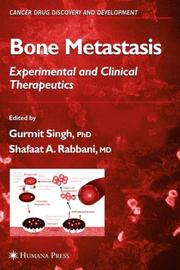| Listing 1 - 7 of 7 |
Sort by
|

ISBN: 0306447231 1489909419 1489909397 Year: 1994 Volume: 354 Publisher: New York Plenum Press
Abstract | Keywords | Export | Availability | Bookmark
 Loading...
Loading...Choose an application
- Reference Manager
- EndNote
- RefWorks (Direct export to RefWorks)
Cancer --- Nutritional aspects --- Congresses --- Diet therapy --- Pathophysiology --- Cancer - Diet therapy - Congresses. --- Cancer - Pathophysiology - Congresses. --- NUTRITION --- BIOLOGICAL MARKERS --- DIET --- NEOPLASMS --- ADVERSE EFFECTS --- ETIOLOGY --- PREVENTION AND CONTROL --- DIET THERAPY
Book
ISBN: 144712863X 1447128648 Year: 2013 Publisher: London ; New York : Springer,
Abstract | Keywords | Export | Availability | Bookmark
 Loading...
Loading...Choose an application
- Reference Manager
- EndNote
- RefWorks (Direct export to RefWorks)
Prostate cancer is the commonest male cancer with over 5 million survivors in US alone. Worldwide, the problem is staggering and has attracted significant attention by media, scientists and cancer experts. Significant research, discoveries, innovations and advances in treatment of this cancer have produced voluminous literature which is difficult to synthesize and assimilate by the medical community. Prostate Cancer: A Comprehensive Perspective is a comprehensive and definitive source which neatly resolves this problem. It covers relevant literature by leading experts in basic science, molecular biology, epidemiology, cancer prevention, cellular imaging, staging, treatment, targeted therapeutics and innovative technologies. Prostate Cancer: A Comprehensive Perspective, is a valuable and timely resource for urologists and oncologists.
Pathology, Surgical -- Methods. --- Pathology, Surgical. --- Prostate -- Cancer -- Pathophysiology. --- Prostate -- Cancer. --- Medicine --- Health & Biological Sciences --- Urology & Nephrology --- Oncology --- Prostate --- Oncology. --- Cancer. --- Medicine. --- Urology. --- Medicine & Public Health. --- Tumors --- Oncology . --- Genitourinary organs --- Diseases
Book
ISBN: 1588296865 9786612971952 1603271546 1282971956 Year: 2011 Publisher: New York : Springer,
Abstract | Keywords | Export | Availability | Bookmark
 Loading...
Loading...Choose an application
- Reference Manager
- EndNote
- RefWorks (Direct export to RefWorks)
Rather than an exhaustive review of all the pathologic conditions of the female breast, Breast Cancer and its Precursor Lesions focuses on the current knowledge, understanding and issues related to breast cancer and its benign lesions that are associated with an increased risk for the subsequent development of cancer. This book targets the language, diagnostic terms and critical communication that must take place between primary care physicians, breast surgeons, oncologists, and general surgical pathologists interested in the pathologist’s perspective on these important diseases. The volume also reviews the current terminology and how to read or write meaningful pathology reports on these entities, the foils and nuances of the pathology and implications for management, and up to date issues in genomics and proteomics of these conditions. The text is succinct, fully informative, and written in “plain language”. All chapters are presented in a uniform fashion, and supplemented by high-quality illustrations and tables. Breast Cancer and its Precursor Lesions will be of great value to pathologists as well as primary care physicians, breast surgeons, and oncologists for understanding breast pathology and its implications for management.
Breast -- Cancer -- Pathophysiology. --- Breast -- Pathophysiology. --- Pathology, Surgical. --- Breast --- Neoplasms by Site --- Breast Diseases --- Neoplasms --- Skin Diseases --- Breast Neoplasms --- Diseases --- Skin and Connective Tissue Diseases --- Medicine --- Health & Biological Sciences --- Pathology --- Oncology --- Cancer --- Tumors --- Cancer. --- Tumors. --- Medicine. --- Oncology. --- Pathology. --- Medicine & Public Health. --- Oncology . --- Disease (Pathology) --- Medical sciences --- Medicine, Preventive --- prevention & control.

ISBN: 9781588294036 158829403X 9781592598922 1617375454 9786610359295 1280359293 1592598927 Year: 2005 Publisher: Totowa, N.J. : Humana Press,
Abstract | Keywords | Export | Availability | Bookmark
 Loading...
Loading...Choose an application
- Reference Manager
- EndNote
- RefWorks (Direct export to RefWorks)
Bone metastasis occurs in 60 to 85% of all breast, prostate, and lung cancer patients and is responsible for increasing morbidity. In Bone Metastasis: Experimental and Clinical Therapeutics, leading bone metastasis experts from around the world explain the molecular underpinnings of the process, review current treatment approaches, and outline future therapeutic strategies. On the basic science side, the authors illuminate the role of various autocrine, paracrine, and immunological factors involved in the progression and establishment of bone metastases, highlighting the physiological processes that lead to bone degradation, pain, angiogenesis, and dysregulation of bone turnover. On the therapeutic side, the authors discuss various strategies that appear to have promise and are currently deployed in treatment or at the experimental stage. They show how the treatment of bone metastases may need to be individualized through a combination of surgical, radiation, and/or pharmacological maneuvers. Their analysis of various pharmacogenomic parameters and tissue environmental factors sets the stage for progress beyond the current standards of using radiation and/or bisphosphonates for palliation. State-of-the-art and innovative, Bone Metastasis: Experimental and Clinical Therapeutics elucidates for all those involved-whether in research or clinical treatment of bone-seeking cancers-the biological processes and therapeutic advances that are already generating significant improvement in the cancer clinic.
Bone Neoplasms --- Neoplasm Metastasis. --- Bone metastasis. --- Métastases osseuses --- secondary. --- Cancer -- Molecular aspects. --- Cancer -- Pathophysiology. --- Bone metastasis --- Bone Diseases --- Neoplasms by Site --- Neoplastic Processes --- Neoplasms --- Pathologic Processes --- Musculoskeletal Diseases --- Diseases --- Pathological Conditions, Signs and Symptoms --- Neoplasm Metastasis --- Medicine --- Health & Biological Sciences --- Oncology --- Bones --- Cancer. --- Metastatic bone cancer --- Metastatic bone disease --- Osseous metastasis --- Skeletal metastasis --- Medicine. --- Oncology. --- Medicine & Public Health. --- Tumors --- Clinical sciences --- Medical profession --- Human biology --- Life sciences --- Medical sciences --- Pathology --- Physicians --- Metastasis --- Cancer --- Oncology .
Book

ISBN: 9781493928866 1493928856 9781493928859 1493928864 Year: 2015 Publisher: New York, NY : Springer New York : Imprint: Springer,
Abstract | Keywords | Export | Availability | Bookmark
 Loading...
Loading...Choose an application
- Reference Manager
- EndNote
- RefWorks (Direct export to RefWorks)
This volume provides a comprehensive review of the molecular mechanisms involved in precancerous lesions and benign and malignant breast tumors. Given the complex molecular pathways in breast cancer biology, the book simplifies these complex mechanisms and highlights the practical issues important for daily practice. Sections are structured to review breast carcinogenesis and the role of familial predisposition and stem cells in initiation and progression of breast cancer. In-depth chapters present morphologic and molecular correlations in precancerous and malignant breast lesions, while outlining highly practical issues that are in practice today in breast pathology, such as evaluation of estrogen, progesterone receptors, and HER-2. Written by experts in the field, Precision Molecular Pathology of Breast Cancer is a valuable resource that covers the current practice of breast pathology and looks into the future with an emphasis on the molecular basis of breast cancer.
Medicine & Public Health. --- Pathology. --- Oncology. --- Gynecology. --- Medicine. --- Médecine --- Gynécologie --- Cancérologie --- Pathologie --- Breast -- Cancer -- Pathophysiology. --- Cancer -- Molecular aspects. --- Pathology, Cellular. --- Pathology, Molecular. --- Breast --- Pathology --- Molecular Targeted Therapy --- Pathology, Molecular --- Methods --- Molecular Diagnostic Techniques --- Breast Neoplasms --- Investigative Techniques --- Drug Therapy --- Molecular Biology --- Clinical Laboratory Techniques --- Neoplasms by Site --- Medicine --- Neoplasms --- Analytical, Diagnostic and Therapeutic Techniques and Equipment --- Therapeutics --- Biochemistry --- Health Occupations --- Biological Science Disciplines --- Diseases --- Disciplines and Occupations --- Natural Science Disciplines --- Health & Biological Sciences --- Molecular aspects --- Cancer --- Pathophysiology. --- Molecular aspects. --- Molecular pathology --- Cellular pathology --- Cytopathology --- Disease (Pathology) --- Medical sciences --- Medicine, Preventive --- Tumors --- Gynaecology --- Generative organs, Female --- Clinical sciences --- Medical profession --- Human biology --- Life sciences --- Physicians --- Molecular biology --- Physiology, Pathological --- Cytodiagnosis --- Oncology . --- Gynecology .
Book
ISBN: 1441908153 1441908137 9786612830693 1441908145 1489981128 1282830694 Year: 2010 Publisher: New York : Springer,
Abstract | Keywords | Export | Availability | Bookmark
 Loading...
Loading...Choose an application
- Reference Manager
- EndNote
- RefWorks (Direct export to RefWorks)
Cells require interactions with extracellular matrix (ECM) components in order to undergo normal morphogenesis with respect to organogenesis. ECM plays a significant role in regulating numerous cellular functions, like cell shape, adhesion, migration, proliferation, polarity, differentiation and apoptosis. In pathological conditions such as cancer, increased synthesis of certain ECM components and/or increased breakdown with consequent generation of ECM cleavage products can contribute to cancer growth and progression. That many growth factors (i.e. FGF, VEGF) are stored in the ECM milieu and are released upon protease-dependent cleavage further confirms the importance of ECM in regulating cell functions. Cell-Extracellular Matrix Interactions in Cancer describes how ECM creates a niche for tumor formation and the contribution of ECM components and their respective receptors in the development and spread of cancer.
Cancer -- Pathophysiology. --- Extracellular matrix proteins. --- Neoplasms -- Physiopathology. --- Cancer --- Extracellular matrix proteins --- Scleroproteins --- Diseases --- Cell Physiological Processes --- Cell Communication --- Neoplasms --- Extracellular Matrix Proteins --- Proteins --- Cell Physiological Phenomena --- Amino Acids, Peptides, and Proteins --- Phenomena and Processes --- Chemicals and Drugs --- Medicine --- Oncology --- Health & Biological Sciences --- Pathophysiology --- Pathophysiology. --- Matrix proteins --- Medicine. --- Cancer research. --- Pharmacology. --- Cell biology. --- Biomedicine. --- Cancer Research. --- Cell Biology. --- Pharmacology/Toxicology. --- Oncology. --- Cytology. --- Toxicology. --- Chemicals --- Pharmacology --- Poisoning --- Poisons --- Cell biology --- Cellular biology --- Biology --- Cells --- Cytologists --- Tumors --- Toxicology --- Drug effects --- Medical pharmacology --- Medical sciences --- Chemotherapy --- Drugs --- Pharmacy --- Cancer research --- Physiological effect
Book
ISBN: 9400797877 9400768656 9400768664 Year: 2013 Publisher: New York : Springer,
Abstract | Keywords | Export | Availability | Bookmark
 Loading...
Loading...Choose an application
- Reference Manager
- EndNote
- RefWorks (Direct export to RefWorks)
Combined modularized therapies for metastatic cancer are pointing to central problems of communication among ‘systems participators’. A communication theory explains 'social engineering', endogenously induced or by implementing non-normative boundary conditions. Evolution-adjusted tumor pathophysiology is borne by an evolution theory, which contrasts narrative evolution histories. The tool of rationalizations constituting the tumor's normativity (inflammation, immune response etc.) represents the non-genomic counterpart of the tumor genome and should be additionally assessed during tumor staging. Evolution-adjusted tumor pathophysiology allows implementing applied systems biology, a novel clinical and pharmaceutical technology for bioengineering tumor response and personalizing tumor therapy. Combined modularized therapy, evolution-adjusted tumor pathophysiology, and ‘universal’ biomarkers concertedly address genetically based tumor heterogeneity.
Cancer -- Pathophysiology. --- Cancer. --- Tumors -- Pathophysiology. --- Tumors. --- Cancer --- Diseases --- Therapeutics --- Biological Evolution --- Analytical, Diagnostic and Therapeutic Techniques and Equipment --- Genetic Processes --- Genetic Phenomena --- Phenomena and Processes --- Evolution, Molecular --- Neoplasms --- Combined Modality Therapy --- Medicine --- Health & Biological Sciences --- Oncology --- Pathophysiology --- Carcinogenesis. --- Tumours --- Oncogenesis --- Pathogenesis of cancer --- Tumorigenesis --- Pathogenesis --- Medicine. --- Cancer research. --- Pharmaceutical technology. --- Systems biology. --- Biomedicine. --- Cancer Research. --- Biomedicine general. --- Systems Biology. --- Pharmaceutical Sciences/Technology. --- Pathology --- Cysts (Pathology) --- Genetic toxicology --- Oncology. --- Biological models. --- Tumors --- Clinical sciences --- Medical profession --- Human biology --- Life sciences --- Medical sciences --- Physicians --- Pharmaceutical laboratory techniques --- Pharmaceutical laboratory technology --- Technology, Pharmaceutical --- Technology --- Models, Biological --- Health Workforce --- Biomedicine, general. --- Computational biology --- Bioinformatics --- Biological systems --- Molecular biology --- Cancer research
| Listing 1 - 7 of 7 |
Sort by
|

 Search
Search Feedback
Feedback About UniCat
About UniCat  Help
Help News
News